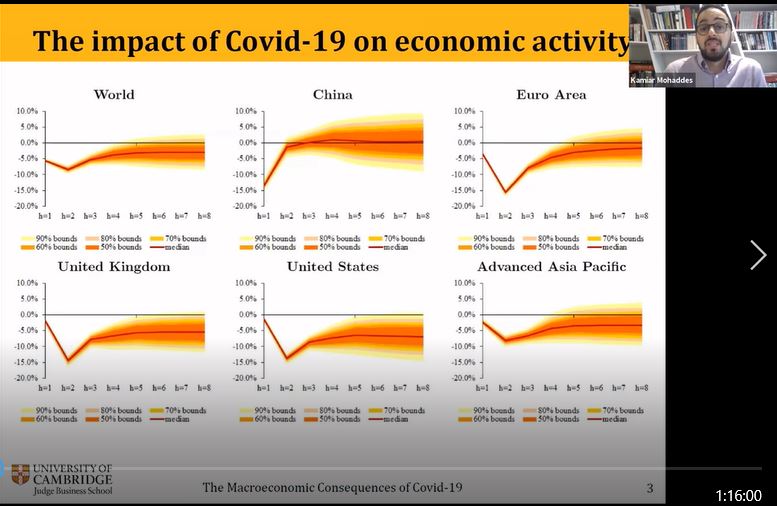Credit Unions Face Similar COVID-19 Challenges, But to Varying Degrees Depending on Location
2020-11-24While the COVID-19 pandemic has negatively impacted economies in every region of the world and will continue to for the next few years, the depth of those impacts on countries and credit unions is not equal.
That was the major lesson international credit union professionals took away from the World Council COVID-19 Response Committee’s Virtual Global Financial Symposium: The Economic Impacts of COVID-19 on Credit Unions.
Dr. Kamiar Mohaddes, an economist at Cambridge Judge Business School at the University of Cambridge, presented his findings from a recent report that show GDP and unemployment across the globe will not get back to pre-pandemic levels by the end of 2021.
In the developed world, the United Kingdom and the United States are forecast to see longer-term negative impacts and lower GDP when compared to the European Union and China.
“For advanced economies the effects in our sample actually range from 2% below pre-crisis GDP by the end of 2021 in the Euro area, to 6.5% in the United States,” said Dr. Mohaddes.
But this represents an opportunity for U.S. credit unions, according to Mike Schenk, chief economist for Credit Union National Association (CUNA), World Council’s direct member organization in the United States.
“Credit unions, in crisis situations are engaged in the marketplace, are lending to people who are in need of capital, instead of behaving like for-profit institutions, which, generally speaking in crisis situations, turn people away, severely tighten underwriting standards, making access to credit much more difficult,” said Schenk.
But Schenk warned that decreased GDP and higher unemployment means credit unions will start to see net loan losses as some members fail to make their payments—leading to more delinquencies and home foreclosures.
Emerging markets
Dr. Mohaddes indicated that emerging markets also will be impacted differently, saying Latin America could be one of the hardest hit regions economically, with Asia responding much better.
“This is mainly due to the higher commodity dependence of Latin America that’s tied to financial conditions, but also because we’ve seen in Latin America countries that have been less successful than emerging Asia in containing the pandemic,” said Dr. Mohaddes.
Adrian Rodriguez, CEO of the Federation of Savings and Credit Cooperatives of Costa Rica, echoed those sentiments, estimating the economic impacts of COVID-19 will be felt for three to five years. But he says not every country will feel those impacts in the same way.
“In Latin America, we have 30 different countries where governments have different capacities. The local (credit union) movements have different capacities, different strengths—so, it’s difficult to have a global picture for the region because it’s diverse. It’s very diverse,” said Rodriguez, who is also a member of World Council’s COVID-19 Response Committee.
Like Latin America, the Caribbean is also dependent on commodity prices, but also on tourism—both of which are taking a hit during the pandemic. Dr. Patrick Antoine, a consultant on International Finance, Economic Policy, International Trade and Agricultural Policy at Econotech, Ltd. in Trinidad and Tobago, told attendees small and micro enterprises will need loans and other financial tools—which credit unions should look at as an opportunity.
“Importantly, another way that credit unions, I think, must look at this period is through the fact that remittances in our region, which of course is significant in the case of Haiti, Jamaica and Dominica—among other countries—those are falling. And of course, with those falling and not rebounding for three or four years according to our forecast, that’s cause for some troubling times,” said Dr. Antoine, who indicated this will impact both consumption and savings.
Dr. Antoine spoke as a guest of the Caribbean Confederation of Credit Unions (CCCU), a World Council direct member that represents 15 national credit union associations in the Caribbean.
You can watch our Virtual Global Financial Symposium in its entire on the World Council YouTube Channel.
